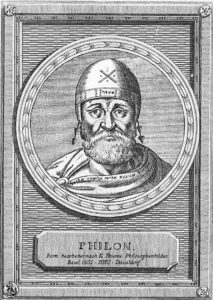 Judeopagan Conflict/ The Temple Mount and Statue of Caligula
Judeopagan Conflict/ The Temple Mount and Statue of Caligula
Both the Jews and the Greeks (e.g. sent emmisaries to Rome) continued to plead their respective causes before the emperor. A Greek delegation, composed of “elders” (gerontes), left for Rome just after the advent of Emperor Caligula, soon to be followed by another, whose members included Isidoros and Apion, the man that Josephus (in Against Apion) had singled out for attack. Toward the end of 39 C.E., a Jewish embassy under the leadership of Philo, the philosopher, was to confront these Greeks in Rome. In his Embassy to Gaius, Philo has left us an excellent description of their misadventures: fifteen months of waiting for Gaius Caligula to deign to receive the Jews, an ordeal made even more unbearable by the emperor’s progressive madness. In his folly, CALIGULA HAD ORDERED AND ENORMOUS GILDED STATUE OF HIMSELF TO BE PLACED IN THE TEMPLE OF JERUSALEM, TO PUNISH THE JEWS OF JAMNIA (YAVNEH), WHO HAD DARED DESTROY AN ALTAR OF THE IMPERIAL CULT, SET UP IN THAT CITY BY ITS GREEK MINORITY.
At long last, a hearing took place in the gardens of Maecenas (Embassy to Gaius, 349-67). The least one could say of this welcome was that it lacked warmth. The Jews respectfully greeted the “August Emperor.” Gritting his teeth, Caligula responded:
“So you are the god haters, the people who do not believe that I am a god. Why, the rest of the world acknowledges me as a god, yet you refuse to pronounce the title!”
The Jews’ “atheism” was well known to the world of antiquity, and Gaius Caligula could hardly have ignored it. It is less certain that he uttered the ineffable Divine Name, as Philo asserts, perhaps to emphasize the abject blasphemy of the mad emperor. The Jews proclaimed their loyalty, insisting that their sacrifices were intended to insure the emperor’s health, safety, and victories. Caligula was not to be duped:
“Granted,” said he, “that this is true and that you have offered sacrifices. But it was to another God, even if it was on my behalf. What is the good of that? You have not sacrificed to me.”
The rest of the interview bordered on the farcical; it was impossible to pursue a serious discussion of the Jews’ political claims and their legal foundations. Caligula finally calmed down.
Philo wrote:
“He became gentler and merely said: ‘I think that these men are not so much criminals as lunatics in not believing that I have been given a divine nature.’ With that he left us and told us to go away too.”
Source: Joseph Mélèze Modrzejewski. The Jews of Egypt.